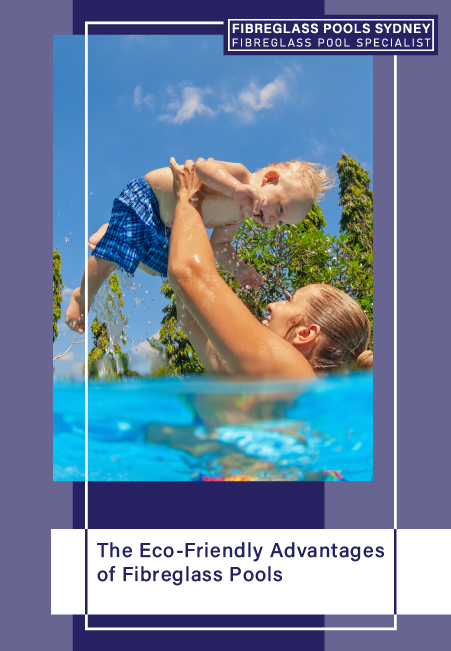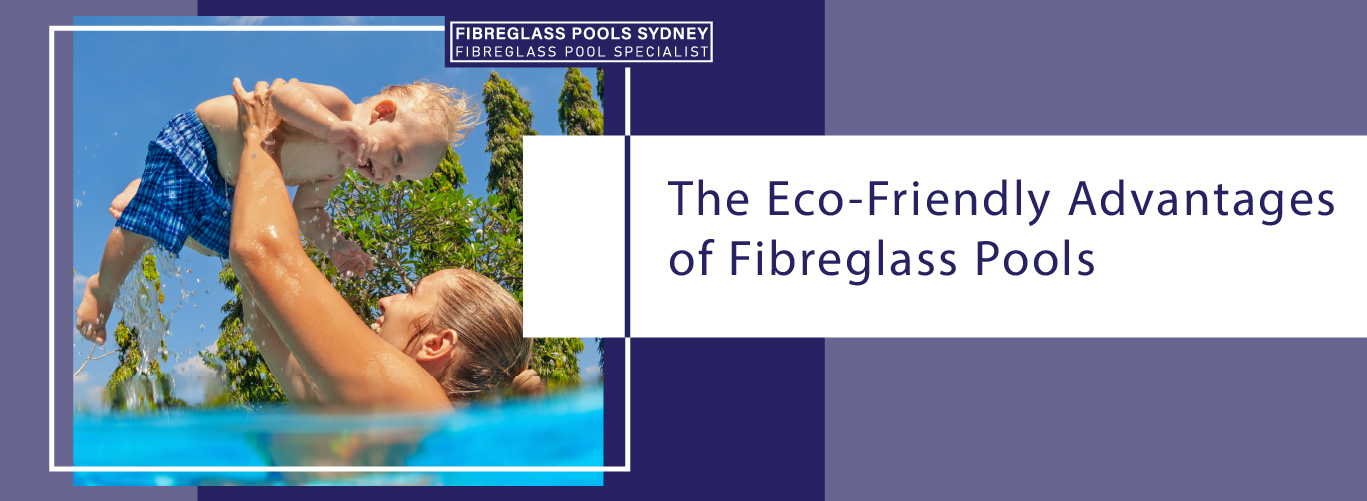The Eco-Friendly Advantages of Fibreglass Pools
In a world where going green is no longer just a fad but a necessity, every aspect of our lifestyle is being scrutinised for its environmental impact. The home improvement sector, too, has seen a remarkable shift in the preferences of homeowners towards sustainable and eco-friendly choices. Swimming pools, once notorious for their heavy impact on the environment, are now being reimagined with eco-conscious design at the forefront. What may come as a pleasant surprise is that fibreglass pools, often lauded for their durability and low maintenance, also play a significant role in creating a more environmentally friendly swimming experience. Below, we explore the numerous ways in which fibreglass pools contribute to a greener planet, and how their advantages might just win over not only your heart but also your commitment to environmental sustainability.

Benefits of Fibreglass Pools
The Eco-Friendly Advantages of Fibreglass Pools Durability and Longevity
A major selling point of fibreglass pools is their remarkable longevity. These pools are designed to hold their shape and structure over time, unlike traditional concrete or vinyl-liner pools which can be susceptible to leaks and require resurfacing. A well-maintained fibreglass pool can last for several decades, ensuring that the resources and energy used to construct it are not squandered on replacements.
Energy Efficiency and Reduced Water Consumption
Fibreglass pools have a smooth gel coat finish that is non-porous, reducing the need for harsh chemicals to maintain water quality. This finish also means that the pool’s filtration system works more efficiently, requiring less energy to keep the water clean.
In terms of water consumption, fibreglass pools are champions. Their non-porous surface significantly reduces the amount of water that evaporates from the pool and, due to the shorter cleaning cycles necessary, the water that is filtered, chemically treated, and discarded is also minimised.
Low Maintenance Requirements
When it comes to maintenance, fibreglass pools are known for their minimal upkeep requirements. The smooth finish of fibreglass not only simplifies the cleaning process but also plays a key role in minimising algae growth, thereby reducing the risk of pool water contamination. Furthermore, the durable nature of fibreglass eliminates the need for frequent resurfacing, resulting in savings on both water consumption and maintenance expenses in the long run.

Environmental Impact
Reduced Carbon Footprint Compared to Traditional Pool Materials
Fibreglass pools are crafted through a meticulous process that results in lower greenhouse gas emissions when compared to the manufacturing of concrete pools. Opting for fibreglass not only offers a durable pool but also signifies a conscious effort towards minimising your environmental impact and contributing positively to the planet’s sustainability goals. By selecting fibreglass pools, you’re taking a significant step in reducing your carbon footprint and embracing eco-friendly practices in your lifestyle.
Use of Sustainable Materials in Fibreglass Pool Construction
The sustainability factor isn’t solely limited to operational practices but extends to the materials used as well. In recent trends, numerous fibreglass pool manufacturers are transitioning towards utilising eco-conscious resins in their construction processes. This shift contributes to the creation of a product that boasts a significantly reduced environmental impact throughout its lifecycle, promoting a more sustainable approach from inception to disposal.
Contribution to Water Conservation Efforts
Water is undeniably a precious resource, vital for sustaining life and supporting ecosystems. Fibreglass pools play a crucial role in conserving this invaluable resource. Their innovative design and advanced materials not only enhance durability but also contribute significantly to water conservation efforts. By minimising water loss through evaporation and optimising filtration systems, fibreglass pools effectively reduce overall water consumption. Additionally, their low maintenance requirements further promote water efficiency, making them a sustainable choice for eco-conscious individuals and communities striving to preserve our planet’s water resources for future generations.

Cost Considerations
Initial Investment vs. Long-Term Savings
It’s widely known that fibreglass pools can come with a higher upfront installation cost compared to traditional pools. Nevertheless, when considering the long-term benefits, such as reduced maintenance, energy efficiency, and water savings, the initial investment transforms into a sustainable and economically advantageous decision. Additionally, fibreglass pools are known for their durability and aesthetic appeal, making them a popular choice for homeowners looking for a practical and visually appealing pool solution.
Energy-Efficient Features and Their Financial Benefits
Fibreglass pools are known for their durability and low maintenance. In addition to these benefits, they often come equipped with energy-efficient features like variable speed pumps and LED lighting. While these features may increase the upfront cost slightly, the long-term financial advantages are significant. By reducing energy consumption and utility bills, fibreglass pools prove to be a sustainable and cost-effective choice for homeowners looking to enjoy a pool that’s both eco-friendly and economically savvy.
Installation and Maintenance
Ease of Installation
Compared to the labour-intensive process of constructing concrete pools, fibreglass pool installation is far quicker and simpler. This not only reduces the disruption to your property but also cuts down on the emissions and fuel consumption associated with heavy machinery and construction equipment.
Maintenance Tips for Prolonging the Lifespan of a Fibreglass Pool
Maintaining the pristine condition of your fibreglass pool involves some care, but rest assured, it’s easier than you might anticipate. Regular cleaning is crucial to avoid any build-up, yet the advantage lies in the fact that you can forego the need for acid washing and other harsh treatments typically required for alternative pool types. By following a consistent upkeep routine and ensuring proper filtration, you can enjoy crystal-clear water and a sparkling pool all season long.
Conclusion
Fibreglass pools offer a multitude of benefits for the environment and your wallet. They stand as a testament to the fact that luxury and eco-friendliness can go hand in hand. By opting for a fibreglass pool, you make a conscious choice to reduce your environmental impact and participate in the global efforts towards sustainability.
For eco-conscious homeowners and pool enthusiasts, the message is clear—when it comes to your swimming oasis, think green with fibreglass pools. The benefits are not only measured in clear, refreshing, and safe swimming experiences but also in the positive impact you make on the environment. It’s time to take the plunge into a greener future with fibreglass pools.
The Eco-Friendly Advantages of Fibreglass Pools
In a world where going green is no longer just a fad but a necessity, every aspect of our lifestyle is being scrutinised for its environmental impact. The home improvement sector, too, has seen a remarkable shift in the preferences of homeowners towards sustainable and eco-friendly choices. Swimming pools, once notorious for their heavy impact on the environment, are now being reimagined with eco-conscious design at the forefront. What may come as a pleasant surprise is that fibreglass pools, often lauded for their durability and low maintenance, also play a significant role in creating a more environmentally friendly swimming experience. Below, we explore the numerous ways in which fibreglass pools contribute to a greener planet, and how their advantages might just win over not only your heart but also your commitment to environmental sustainability.

Benefits of Fibreglass Pools
The Eco-Friendly Advantages of Fibreglass Pools Durability and Longevity
A major selling point of fibreglass pools is their remarkable longevity. These pools are designed to hold their shape and structure over time, unlike traditional concrete or vinyl-liner pools which can be susceptible to leaks and require resurfacing. A well-maintained fibreglass pool can last for several decades, ensuring that the resources and energy used to construct it are not squandered on replacements.
Energy Efficiency and Reduced Water Consumption
Fibreglass pools have a smooth gel coat finish that is non-porous, reducing the need for harsh chemicals to maintain water quality. This finish also means that the pool’s filtration system works more efficiently, requiring less energy to keep the water clean.
In terms of water consumption, fibreglass pools are champions. Their non-porous surface significantly reduces the amount of water that evaporates from the pool and, due to the shorter cleaning cycles necessary, the water that is filtered, chemically treated, and discarded is also minimised.
Low Maintenance Requirements
When it comes to maintenance, fibreglass pools are known for their minimal upkeep requirements. The smooth finish of fibreglass not only simplifies the cleaning process but also plays a key role in minimising algae growth, thereby reducing the risk of pool water contamination. Furthermore, the durable nature of fibreglass eliminates the need for frequent resurfacing, resulting in savings on both water consumption and maintenance expenses in the long run.

Environmental Impact
Reduced Carbon Footprint Compared to Traditional Pool Materials
Fibreglass pools are crafted through a meticulous process that results in lower greenhouse gas emissions when compared to the manufacturing of concrete pools. Opting for fibreglass not only offers a durable pool but also signifies a conscious effort towards minimising your environmental impact and contributing positively to the planet’s sustainability goals. By selecting fibreglass pools, you’re taking a significant step in reducing your carbon footprint and embracing eco-friendly practices in your lifestyle.
Use of Sustainable Materials in Fibreglass Pool Construction
The sustainability factor isn’t solely limited to operational practices but extends to the materials used as well. In recent trends, numerous fibreglass pool manufacturers are transitioning towards utilising eco-conscious resins in their construction processes. This shift contributes to the creation of a product that boasts a significantly reduced environmental impact throughout its lifecycle, promoting a more sustainable approach from inception to disposal.
Contribution to Water Conservation Efforts
Water is undeniably a precious resource, vital for sustaining life and supporting ecosystems. Fibreglass pools play a crucial role in conserving this invaluable resource. Their innovative design and advanced materials not only enhance durability but also contribute significantly to water conservation efforts. By minimising water loss through evaporation and optimising filtration systems, fibreglass pools effectively reduce overall water consumption. Additionally, their low maintenance requirements further promote water efficiency, making them a sustainable choice for eco-conscious individuals and communities striving to preserve our planet’s water resources for future generations.

Cost Considerations
Initial Investment vs. Long-Term Savings
It’s widely known that fibreglass pools can come with a higher upfront installation cost compared to traditional pools. Nevertheless, when considering the long-term benefits, such as reduced maintenance, energy efficiency, and water savings, the initial investment transforms into a sustainable and economically advantageous decision. Additionally, fibreglass pools are known for their durability and aesthetic appeal, making them a popular choice for homeowners looking for a practical and visually appealing pool solution.
Energy-Efficient Features and Their Financial Benefits
Fibreglass pools are known for their durability and low maintenance. In addition to these benefits, they often come equipped with energy-efficient features like variable speed pumps and LED lighting. While these features may increase the upfront cost slightly, the long-term financial advantages are significant. By reducing energy consumption and utility bills, fibreglass pools prove to be a sustainable and cost-effective choice for homeowners looking to enjoy a pool that’s both eco-friendly and economically savvy.
Installation and Maintenance
Ease of Installation
Compared to the labour-intensive process of constructing concrete pools, fibreglass pool installation is far quicker and simpler. This not only reduces the disruption to your property but also cuts down on the emissions and fuel consumption associated with heavy machinery and construction equipment.
Maintenance Tips for Prolonging the Lifespan of a Fibreglass Pool
Maintaining the pristine condition of your fibreglass pool involves some care, but rest assured, it’s easier than you might anticipate. Regular cleaning is crucial to avoid any build-up, yet the advantage lies in the fact that you can forego the need for acid washing and other harsh treatments typically required for alternative pool types. By following a consistent upkeep routine and ensuring proper filtration, you can enjoy crystal-clear water and a sparkling pool all season long.
Conclusion
Fibreglass pools offer a multitude of benefits for the environment and your wallet. They stand as a testament to the fact that luxury and eco-friendliness can go hand in hand. By opting for a fibreglass pool, you make a conscious choice to reduce your environmental impact and participate in the global efforts towards sustainability.
For eco-conscious homeowners and pool enthusiasts, the message is clear—when it comes to your swimming oasis, think green with fibreglass pools. The benefits are not only measured in clear, refreshing, and safe swimming experiences but also in the positive impact you make on the environment. It’s time to take the plunge into a greener future with fibreglass pools.


